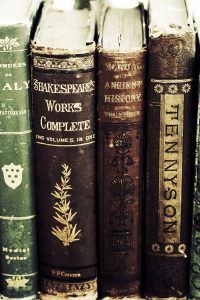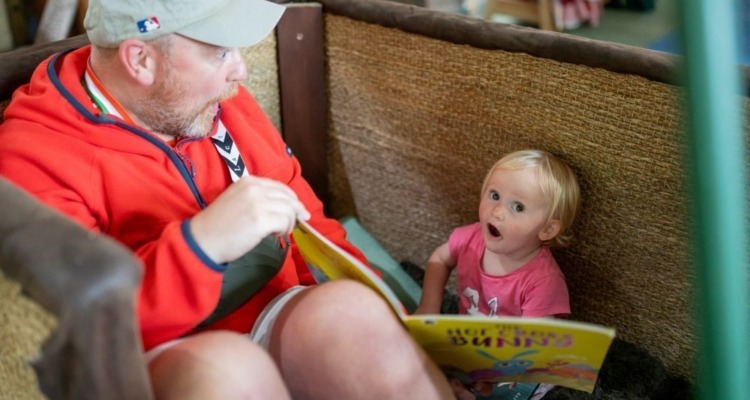Lifesavers by Jane Davis
We're embracing 'Throwback Thursday' with a blog first published by our founder and director Dr Jane Davis in September 2013.
Recently, Jane Davis wrote about the beginnings of The Reader for The Guardian. Recalling again the chain of events which inspired the Shared Reading movement, Jane has turned back to a blog post first published in 2013.
Lifesavers
In June 1983, at the age of 27, I sat in the garden of the Albert pub in Lark Lane with Brian Nellist, who had been my third year tutor at University and told him, ‘I want to teach adults to read.’
My degree, First Class honours, top of my year, was the first success I had had in the world. I was a not-very-mature mature student about to start her adult life.
The day the results came out my ex-partner committed suicide. I had ended our relationship – which involved a lot of drugs and drink – so as to be able to concentrate on my degree. I was left with a terrible sense that I had to make my life count for something – that the thing I had chosen, ‘literature’, had to pay.
Within 3 years my mother would die of alcoholism. These two deaths were utterly significant in the much later development of The Reader. They seemed to stack up an equation – what life is, and how you value it, what matters, what things cost.
In the pub garden that sunny day, Brian persuaded me that instead of becoming an adult literacy tutor, I should do a Ph.D. I took his advice and the three years I spent writing my thesis, Visionary Realism: from George Eliot to Doris Lessing laid down the foundations of my adult life. I became a university teacher of literature. My desire to ‘teach adults to read’ stayed stubbornly put, however and I taught Adult Continuing Education for the next 20 years.
I had no ambitions and absolutely no sense that I could affect the world in any way, nor would I want to. I thought the world wasn’t very good, and I didn’t respect it very much.
As I look at memories of what I felt at that time, it seemed that the most important thing was to make a small good world around myself, immediately – in my house, with my family, in classes I taught.
That was the world I could affect. I had to make my own life pay – I felt – for those two lives which, if I had not actively taken, I had not been able to save. This has always been at the back of my sense of my own adult life and behind my teaching or sharing of literature. Can it help?
For a long time, I wanted to be a writer. Finishing my Ph.D. had taught me that I could complete things, so for many years each day I got up at 5.00am and wrote. I wrote six novels during this period, none of them publishable, but all important to me: I was remaking the world in images I chose. I wrote stories of people whose lives had been smashed up, whose worlds were broken. And then I taught literature, part-time, to adults. Being an unpublished novelist was a sad state (though I didn’t care a jot for a long time: I just had to write), but it served as a sort of preparation for the hard slog that would become The Reader: I was learning to believe in and to build structures. It was a fifteen-year apprenticeship in not giving up.
During this long and intensely private period of my life a traumatic event took place. I felt the world, the cosmos, was broken. Literature, in this period, assisted me – as breathing apparatus assists in a major fire. I can remember reading Psalm 91 when I was so frightened that, night after night, I was scared to go to sleep:

He is my refuge and my fortress: my God; in him will I trust.
Surely he shall deliver thee from the snare of the fowler,
and from the noisome pestilence.
He shall cover thee with his feathers, and under his wings shalt thou trust:
his truth shall be thy shield and buckler.
Thou shalt not be afraid for the terror by night; nor for the arrow that flieth by day;
nor for the pestilence that walketh in darkness;
nor for the destruction that wasteth at noonday.
I did not, do not, ‘believe in god’ in any sense that a person with a formed religious faith would recognise. Yet I needed those words – ‘fortress' ‘deliver thee’, ‘snare of the fowler’. The words met me in my place of terror and offered –what? Recognition? Language?
They are ancient words, words to which people, for more than two thousand years, have turned to in their terrors. Unable to sleep, I took comfort from those countless human beings, and the words to which they had turned. The verses seemed to offer structure, shape, and yes, refuge. I liked reading them aloud. They gave me, in the deepest sense, comfort. And it was a surprise – I had no idea those poems, The Psalms, were still alive.
 Many other books also helped me – the entire works of George Eliot (including the nine volumes of her Letters). Shakespeare. The Assistant by Bernard Malamud. Shikasta and The Sirian Experiments by Doris Lessing. The works of Russell Hoban. Poetry, starting with Chaucer and going as far as my dear old friend Les Murray’s An Absolutely Ordinary Rainbow, and probably further. George Herbert. Paradise Lost. The Prelude and everything else by Wordsworth.
Many other books also helped me – the entire works of George Eliot (including the nine volumes of her Letters). Shakespeare. The Assistant by Bernard Malamud. Shikasta and The Sirian Experiments by Doris Lessing. The works of Russell Hoban. Poetry, starting with Chaucer and going as far as my dear old friend Les Murray’s An Absolutely Ordinary Rainbow, and probably further. George Herbert. Paradise Lost. The Prelude and everything else by Wordsworth.
These books gave me back my inner and outer experiences in words and sentences, feelings and thoughts, images, worlds, cosmologies, voices, languages. They gave me meanings which matched what I already – wordlessly – knew.
The Reader has grown out of and from the wonderful compost of sadnesses, ruins, breakages, losses and terrors of my own real life and the lives of others I have known.
When I started my mission (‘great books out of the university and into the hands of people who need them’) in 2002, it was with the intent of passing on this strong, life-saving stuff to others. Having felt the true weight of the trouble many humans, most humans, have to live through, the seriousness of needing some strong help really comes home. Of course there is lightweight reading, and some people are lucky enough to live on the surface most of the time. Let them continue to bob along happily, reading for pleasure. But many of us are shipwrecked, drowning. We are reading, like the child Davy in David Copperfield, ‘as if for life’. Is that reading for pleasure? Is it bibliotherapy? These are not the right words but no matter, so long as they bring us what we need.
We need lifesavers, the great books.
This post was originally published on ReaderJaneDavis.
Share
Related Articles

We cannot just tell parents to read more. To truly improve children’s futures through reading, we need to properly support the adults around them to do so.
Responding to the Department of Education's announcement that 2026 will be a Year of Reading, The Reader's Managing Director Jemma…

Storybarn Book of the Month: Saving the Butterfly
This month, as part of Refugee Week (16-22 June), we've been taking a look back at one of our favourites…

Shared Reading in Wirral Libraries: ‘As a kid people read stories to you but as an adult you lose that – and it’s a fantastic thing to do!’
Two Strategic Librarians for Wirral Libraries, Kathleen McKean and Diane Mitchell have been working in partnership with the UK’s largest…


